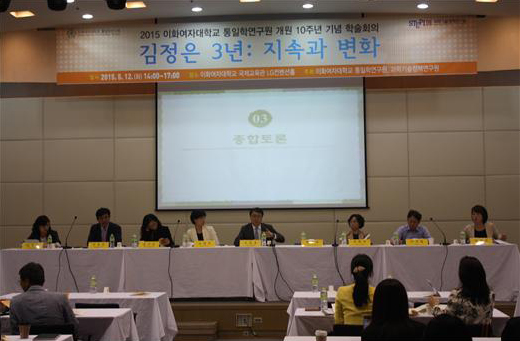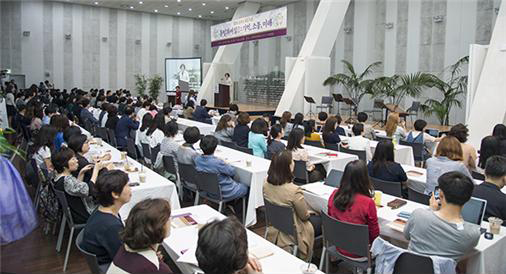본문
The Ewha Institute of Unification Studies (EIUS)
1. Introduction of the Institute of Unification Studies
The Ewha Institute of Unification Studies (EIUS) was founded in March 2005 as a research institute affiliated with Ewha Womans University. It seeks to provide female scholars an academic foundation for North Korean and Unification Studies. Since its establishment, EIUS has regularly held a variety of academic events including national and international conferences, open lectures on unification studies, colloquiums, and more. The outcomes of such events have been published in the form of academic theses, reports, and journal articles. Additionally, the institute has attracted many students, professionals, and experts to such events because each event offers opportunities to closely examine the realities of North Korea, inter-Korean relations, and other topics in regards to unification. Through this process, EIUS has concentrated its efforts on cultivating women who are equipped with both theoretical and practical expertise in inter-Korean relations.
In collaboration with government agencies, including the Ministry of Unification, the Ministry of Employment and Labor, and the Ministry of Gender Equality and Family, and other partners, such as the Korea Institute for National Unification, the Institute for Unification Education, and the National Human Rights Commission of Korea, EIUS has carried out research projects on a variety of topics on inter-Korean issues, such as North-South unification, the North Korean defector population, and more. In academic circles, EIUS has worked with the Korean Association of North Korean Studies, departments of unification and North Korean studies housed in other universities, and academic associations with an interest in unification and North Korea. In addition, researchers and students from numerous countries including Australia, United States, Germany, Japan, China, and France have built cooperative relationships with the institute. For instance, as of January 2017, EIUS is currently hosting Janice Y. Kim, a David L. Boren Fellowship recipient from the United States.
Furthermore, EIUS has a distinctive advantage when combining theory and practice due to its close relationship with the Department of North Korean Studies at Ewha Womans University. This department is atypical given that very few universities in South Korea dedicate an entire academic department to exploring North Korean studies. Due to this close relationship, EIUS has had the resources and ability to consistently raise South Korean public awareness on issues pertaining to unification and North Korea, through events such as open colloquiums and seminars. Since its inception in 2005, the strong network that EIUS has cultivated has served as an invaluable asset to young women educated at Ewha Womans University, as they go on to become highly qualified researchers and experts on North Korea/inter-Korean issues.
While EIUS has certainly made a plethora of meaningful achievements over the past 12 years, our work is far from complete. The institute now has a new dream. We, as students, researchers, and professionals of EIUS, will dedicate all of our collective efforts into analyzing what unification could look like in the future. We understand that the process of unification is not just a simple integration of a divided country, but that rather, it will be a complicated journey that will involve many obstacles and difficulties. Thus, we are dedicated to the critical and scholarly analysis of this topic. We strongly believe that our academic and professional works will one day be of significant support to the process of unification.
2. Academic Communication
* Special Lectures “Open Lecture on Unification”
“Open Lecture on Unification” is a series of special public lectures held on a quarterly basis. This series invites specialists on North Korea and unification issues to deliver lectures and provides a platform for discussion between the lecturers and the audience through Q&A sessions. The 38th Open Lecture on Unification was jointly hosted by EIUS and the Institute for Unification Education under the Ministry of Unification on October 11, 2016. Mr. Marine Buissonniere, a former member of Doctors Without Borders, gave a lecture under the theme of “South Korea Faces Socio-psychological Problems among North Korean Defectors.”
* Colloquiums, Conferences, Forums, Lectures
- Annual Colloquium on North Korea
The annual colloquium is an open discussion forum jointly organized by EIUS and the head office of the Korean Sharing Movement with an aim to analyze the new year’s address given each year by the North Korean leader. This is a time for all those interested in North Korean issues to gather and share prospects on North Korea’s political situation in the upcoming year. The 8th annual colloquium was held on January 2, 2017.
- Annual Spring/Fall International Conference

The EIUS hosts two semiannual international conferences. The 2016 Fall International Conference was co-hosted by EIUS and the Konrad Adenauer Foundation. Dr. Stefan Wolle delivered remarks under the topic of “Life under East German Dictatorship and the Case Study of the Korean Peninsula.”

- Yoon Hoo-Jung Unification Forum
EIUS has held the Yoon Hoo-Jung Unification Forum every year since 2014 to honor Ewha’s former President Emeritus Yoon Hoo-Jung, who had dedicated herself to the study of North Korea and unification. The 3rd forum was organized in 2016 under the theme of “Unification and Women II: Memory, Communication and Future.”
3. Research Projects
The EIUS has been actively participating in a number of projects initiated by government ministries and government-affiliated organizations. Projects currently in progress are listed as follows.
* Research Projects Overview (2012 - Present)
- Research support for “Measures to Prevent Natural Disasters in North Korea and Build a Disaster Safety Net on the Korean Peninsula”
(Ministry of Unification, Feb. 2012 – Dec. 2012)
- “Systemic Transition in North Korea in the Kim Jong-un Era: Focusing on Sujian Guo’s Elite Policy Choices”
(National Research Foundation of Korea, Jul. 2013 – Jun. 2014)
- “A Case Study on North Korean Defectors’ Settlement in South Korea from the Defectors’ Perspective”
(North Korean Refugees Foundation, May 2014 – Nov. 2014)
- “A Field Study on North Korean Defectors’ Labor Rights”
(National Human Rights Commission of Korea, Jun. 2015 – Dec. 2015)
- “A Study on North Korean Society in Relation to Demographic Phenomena and Policy Responses in the Kim Jong-un Era”
(National Research Foundation of Korea, Sep. 2015 – Aug. 2016)
- “A Study on the Northeast Asia Peace and Cooperation Initiative and the Trust-building Process on the Korean Peninsula”
(Ministry of Foreign Affairs, Nov. 2015 – Dec. 2015)
- “Measures for Enhancing College Adaptability of North Korean Defectors”
(Korea Hana Foundation, Aug. 2016 – Nov. 2016)
- “A Gender Impact Assessment on Settlement Support Policy for North Korean Defectors”
(Ministry of Gender Equality and Family, Sep. 2016 – Nov. 2016)
4. Publications
The EIUS has published many academic books and articles on unification and North Korean studies, including the semiannual Journal of Peace and Unification. Its most prominent publications are listed as follows.
- Journal of Peace and Unification (Total 12 issues)
Journal of Peace and Unification is an English-language journal on unification and North Korean studies and has been published on a semiannual basis since 2011. The journal was selected as a candidate for the list of accredited journals by the National Research Foundation of Korea. The current issue is Vol.6, No.2, Fall 2016 (Issue No.12).
- In Fundamental Search of Peace on the Korean Peninsula in the 21st Century (Authored by the Ewha Institute of Unification Studies, 2008)
- The Geography of North Korean Literature (Ewha Womans University Press, 2008)
- The History of Inter-Korean Relations (Ewha Womans University Press, 2009)
- The Geography of North Korean Literature II (Authored by the Ewha Institute of Unification Studies, Cheongdong Geoul, 2009)
- Life of North Korean Women in the Military-First Era (Ewha Womans University Press, 2010)
5. International Partnership
The EIUS has signed partnership agreements with a number of institutions both in and out of South Korea in order to actively collaborate in academia and research. Our recent partnerships in the past five years are described as follows:
- Konrad Adenauer Foundation (Apr. 2012)
Joint studies and the co-hosting of international conferences for the purpose of promoting peace on the Korean Peninsula
- Future Foundation of Korea (Sep. 2013)
Scholarships for North Korean female defectors enrolled in master's or doctorate programs
- Department of Korean Studies at the Free University of Berlin (Nov. 2013)
Collaboration in academic projects and research
- Korea Institute for National Unification (Sep. 2014)
Various activities to stimulate the field of North Korean and unification studies with the aim to enhance the research capacity of graduate students and strengthen the networks between senior and junior researchers
- Center for Korean Unification in Dentistry at Seoul National University (Nov. 2014)
Spearheading inter-Korean exchanges and nurturing future leaders of unification through cooperation in the field of dentistry and exchanges of academic information such as professional research sources, books, and journals.
6. Training Experience: Field Work, Internship
As of January 2017, EIUS is hosting a U.S. government scholarship recipient on an internship, and a student from Germany is scheduled to begin her field work soon. The benefits offered to any student who is undertaking a training experience at the EIUS are described as follows.
- Authorized access to the Information Center on North Korea under the Ministry of Unification
- Interaction with North Korea and unification specialists with specialized research interest such as women, minorities, and everyday life
- Participation in diverse research projects conducted by EIUS, and direct/indirect experiences in research activity
- Training opportunities to gain a comprehensive perspective on inter-Korean politics, economy, society, culture and diplomacy with the help of mentoring from senior researchers and academic exchanges with other researchers from various fields
- Access to governmental libraries equipped with an abundance of resources related to unification and North Korean studies
- Access to the Ewha Womans University Library and its database
- An expanded understanding of North Korean society via diverse research methods













